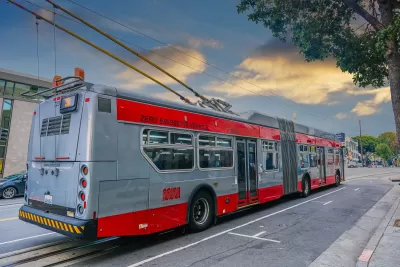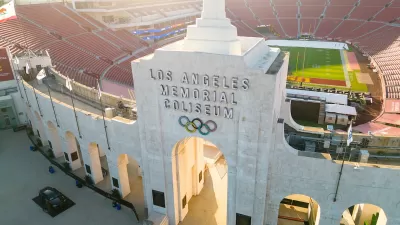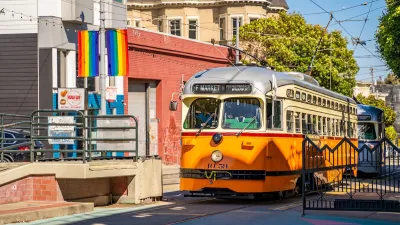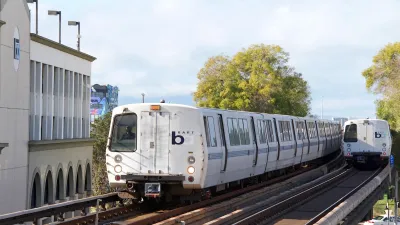To decarbonize its bus system, a new study recommends adding more substantial battery packs to the city’s historic—and all-electric—trolley bus fleet rather than replacing trolley buses with electric buses that require lengthy charging periods.

“Combining battery technology with existing trolley bus infrastructure is the best way for San Francisco to achieve zero emissions and a robust transit service, according to a study released Wednesday by The Climate and Community Project.” Writing in Streetsblog San Francisco, Roger Rudick outlines the report’s findings.
The report recommends adding In Motion Charging (IMC) technology and expanding its entire trolley bus fleet as the fastest and most efficient option for reducing carbon emissions. “However, SFMTA is also looking at replacing historic trolley-bus lines with … battery buses, even though trolley-buses already use zero-emission technology, powered by overhead wire.”
Rudick notes that “This seems to echo the historical error made by San Francisco and other American cities after WWII when they removed electric rail and trolley bus systems and replaced them with diesel buses.”
San Francisco Electrical Construction Industry Research & Advocacy Director Alex Lantsberg says battery-powered buses will have to spend more time out of the system charging, meaning the city will need more of them to provide effective service. “In addition, buses have to expend more energy accelerating when they carry heavy battery packs. And battery-only buses will do more damage to roads because they are heavier.”
Ultimately, Rudick writes, “the idea is to leverage and expand, rather than remove, the existing overhead trolley wire network. That will allow the city to reach zero emission transit more quickly than buying thousands of untested battery-only buses, many of which would just replace buses that are already zero-emission vehicles.”
FULL STORY: Study: Trolley Buses with Batteries are the Best Path to Zero Emissions

Alabama: Trump Terminates Settlements for Black Communities Harmed By Raw Sewage
Trump deemed the landmark civil rights agreement “illegal DEI and environmental justice policy.”

Planetizen Federal Action Tracker
A weekly monitor of how Trump’s orders and actions are impacting planners and planning in America.

The 120 Year Old Tiny Home Villages That Sheltered San Francisco’s Earthquake Refugees
More than a century ago, San Francisco mobilized to house thousands of residents displaced by the 1906 earthquake. Could their strategy offer a model for the present?

In Both Crashes and Crime, Public Transportation is Far Safer than Driving
Contrary to popular assumptions, public transportation has far lower crash and crime rates than automobile travel. For safer communities, improve and encourage transit travel.

Report: Zoning Reforms Should Complement Nashville’s Ambitious Transit Plan
Without reform, restrictive zoning codes will limit the impact of the city’s planned transit expansion and could exclude some of the residents who depend on transit the most.

Judge Orders Release of Frozen IRA, IIJA Funding
The decision is a victory for environmental groups who charged that freezing funds for critical infrastructure and disaster response programs caused “real and irreparable harm” to communities.
Urban Design for Planners 1: Software Tools
This six-course series explores essential urban design concepts using open source software and equips planners with the tools they need to participate fully in the urban design process.
Planning for Universal Design
Learn the tools for implementing Universal Design in planning regulations.
Clanton & Associates, Inc.
Jessamine County Fiscal Court
Institute for Housing and Urban Development Studies (IHS)
City of Grandview
Harvard GSD Executive Education
Toledo-Lucas County Plan Commissions
Salt Lake City
NYU Wagner Graduate School of Public Service





























